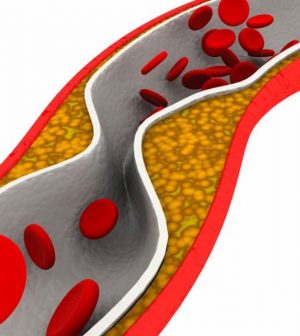- Could Your Grocery Store Meat Be Causing Recurring UTIs?
- Are You Making This Expensive Thermostat Error This Winter?
- Recognizing the Signs of Hypothyroidism
- 10 Strategies to Overcome Insomnia
- Could Artificial Sweeteners Be Aging the Brain Faster?
- Techniques for Soothing Your Nervous System
- Does the Water in Your House Smell Funny? Here’s Why
- Can a Daily Dose of Apple Cider Vinegar Actually Aid Weight Loss?
- 6 Health Beverages That Can Actually Spike Your Blood Sugar
- Treatment Options for Social Anxiety Disorder
Most With Very High Cholesterol Missing Out on Right Meds

Less than 40 percent of American adults with extremely high cholesterol levels get the medications they should, a new study finds.
Researchers examined federal government data to assess rates of awareness, screening and the use of cholesterol-lowering statins among adults aged 20 and older with extremely high levels of “bad” LDL cholesterol.
The investigators also looked at a subgroup of patients with familial hypercholesterolemia, a genetic disorder that causes extremely high cholesterol that increases the risk of early heart disease.
Rates of cholesterol screening and awareness were high (more than 80 percent) among adults with definite/probable familial hypercholesterolemia and extremely high cholesterol, but only 38 percent of them took statins.
Of those who took statins, only 30 percent of patients with extremely high cholesterol had been prescribed a high-intensity statin.
Patients in the study least likely to be taking statins included those who were younger, uninsured, and without a regular source of health care.
“Young adults may be less likely to think that they are at risk of cardiovascular disease, and clinicians may be less likely to initiate statin therapy in this population,” wrote lead author Dr. Emily Bucholz, who’s with the department of medicine at Boston Children’s Hospital.
“It is possible that lifestyle modifications continue to be prescribed as an initial treatment prior to initiating statin therapy,” she added.
The findings were published March 26 in the journal Circulation.
“Markedly elevated levels of ‘bad’ cholesterol put you at increased risk of developing heart disease and developing it earlier in life,” Circulation Editor-in-Chief Joseph Hill said in a journal news release.
“If your ‘bad’ cholesterol is over 190, you should work with your physician regarding optimal drug treatment, in addition to lifestyle changes and management of other risk factors,” Hill added.
More information
The U.S. National Library of Medicine outlines how to lower cholesterol.
Source: HealthDay
Copyright © 2026 HealthDay. All rights reserved.










